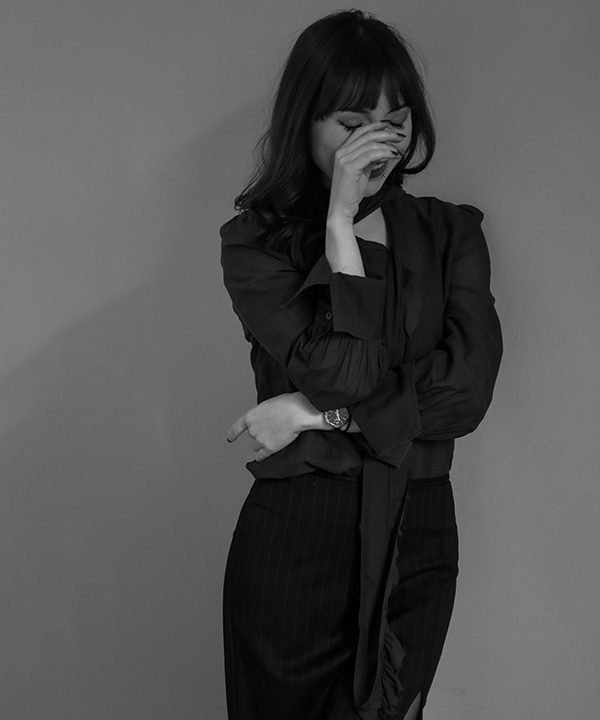
Wearing What Once Was: A Vintage Reflection
June 25, 2025
When Life Begins to Read Like a Novel
July 14, 2025

“Who are you?” And she, without a moment’s hesitation. “I am the soul in limbo.” (Nadja – André Breton)
The story of those whose restlessness is awakened by reality.
The tendency of having things defined. Of having people described. Of having conversations clarified. And the purpose? Either way coming from the fear of the dark, which in this very case symbolizes uncertainty—of other’s intentions, of their nature, of the silence between spoken words. Interpretation, once put in the context of the past and knowledge so as to give guidance to the present moment, not only ruins the joy of spontaneous flow, but endangers one’s authenticity of being different from known or experienced before. I have always found it very sad—the inability to let the life happen due to the limitations of what has been experienced before. It reminds me of those early surrealist films, or moments from Nadja—where scenes are fragmented, light moves unevenly across a hotel hallway, and the absence of a plot is precisely what gives it meaning. In such atmospheres, women are not explained—they are sensed, like perfume in a room one doesn’t remember entering. Reality, when forced into structure, loses its ability to enchant.
When I see Isa, I sense a reflection—a young woman living the echo of the nonchalant chic—early morning, awakened by the rhythm of the city she knows deeply. The first thought on her mind is the mood of the day waking her up. She drinks espresso in her bed, and responds to messages three days later—not out of lack of care, as the social norms make her feel under pressure. She is the one wearing silk under a man’s suit and leaving one button more uncovered on her white shirts. The one that makes the situation intriguing by subtly putting her hand on her leg in the middle of the business meeting. Or the one that says ‘very bad’ when casually asked about her day in the passing. She is the type that breaks tradition—and refuses to fit into definitions.
By living authentically one’s own film in reality, a certain kind of rebellion gets awakened by the misunderstanding of the others. The gaze, even though by its core old-fashioned, is still ever-present when looking for explanation. And perhaps—it always will be. But those who choose to remain undefined do not live to be decoded. They live to be felt, once, and never forgotten. They are not the protagonists of glossy fictions, nor icons created for trend cycles. Their allure lies in being unreadable yet unforgettable—like a photo found in someone else’s coat pocket. The real narrative, is not in what is told, but in what is written between the lines. That space—between gaze and grasp—is where elegance lives.
“Chi sei?” E lei, senza un attimo di esitazione. “Sono l’anima in bilico.” (Nadja – André Breton)
La storia di coloro il cui irrequietezza viene risvegliata dalla realtà.
La tendenza ad avere tutto definito. A descrivere le persone. A chiarire le conversazioni. E lo scopo? In ogni caso nasce dalla paura del buio, che in questo preciso caso simboleggia l’incertezza—delle intenzioni altrui, della loro natura, del silenzio tra le parole pronunciate. L’interpretazione, una volta inserita nel contesto del passato e del sapere per poter dare una guida al momento presente, non solo rovina la gioia del fluire spontaneo, ma mette in pericolo l’autenticità dell’essere diversi da ciò che è già stato conosciuto o vissuto prima. L’ho sempre trovata una cosa molto triste—l’incapacità di lasciare che la vita accada, a causa dei limiti imposti da ciò che è già stato sperimentato. Mi ricorda quei primi film surrealisti, o certi passaggi di Nadja—in cui le scene sono frammentate, la luce si muove in modo irregolare lungo il corridoio di un hotel, e l’assenza di trama è proprio ciò che le dà significato. In queste atmosfere, le donne non vengono spiegate—vengono percepite, come un profumo in una stanza in cui non si ricorda di essere entrati. La realtà, quando viene forzata in una struttura, perde la capacità di incantare.
Quando vedo Isa, percepisco un riflesso—una giovane donna che vive l’eco dello chic nonchalant—mattina presto, risvegliata dal ritmo della città che conosce profondamente. Il primo pensiero nella sua mente è l’umore del giorno che la sveglia. Beve l’espresso nel suo letto e risponde ai messaggi tre giorni dopo—non per mancanza di cura, ma perché le norme sociali la fanno sentire sotto pressione. È quella che indossa la seta sotto un completo maschile e lascia un bottone in più slacciato sulla sua camicia bianca. Quella che rende la situazione intrigante posando delicatamente la mano sulla gamba durante una riunione d’affari. O quella che dice “malissimo” quando, con leggerezza, le si chiede com’è andata la giornata nel corridoio. È il tipo che rompe le tradizioni—e rifiuta di rientrare in qualsiasi definizione.
Vivendo autenticamente il proprio film nella realtà, si risveglia un certo tipo di ribellione attraverso l’incomprensione degli altri. Lo sguardo, pur essendo nella sua essenza antiquato, è ancora onnipresente nella ricerca di spiegazioni. E forse—lo sarà sempre. Ma coloro che scelgono di restare indefiniti non vivono per essere decifrati. Vivono per essere sentiti, una volta, e mai dimenticati. Non sono i protagonisti di finzioni patinate, né icone create per i cicli delle tendenze. Il loro fascino risiede nell’essere illeggibili ma indimenticabili—come una foto trovata nella tasca del cappotto di qualcun altro. La narrazione vera non è in ciò che viene raccontato, ma in ciò che è scritto tra le righe. Quello spazio—tra lo sguardo e la presa—è dove vive l’eleganza.








